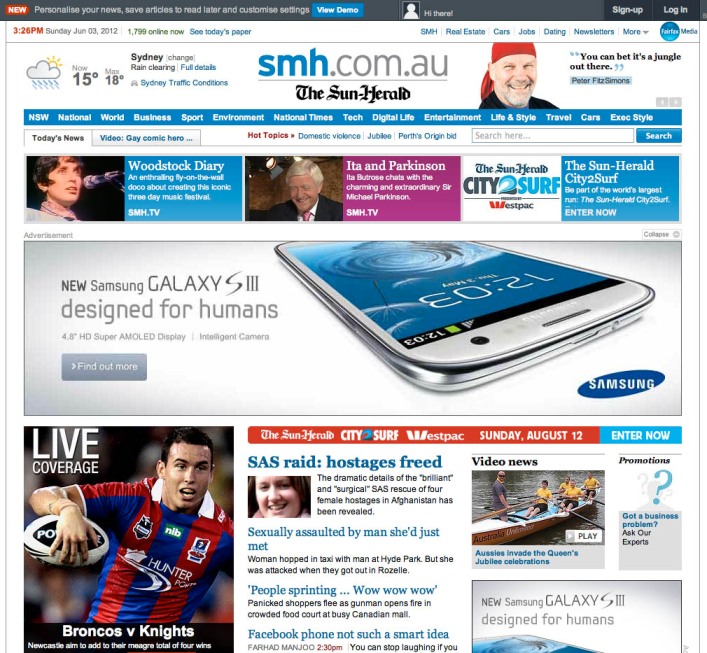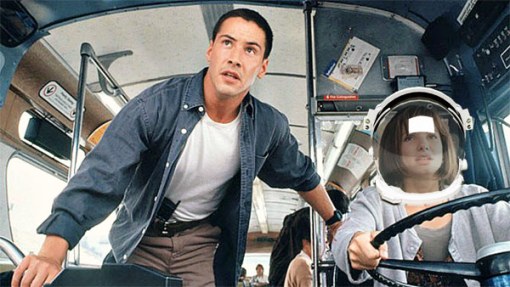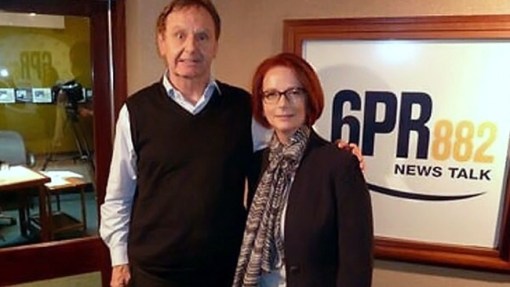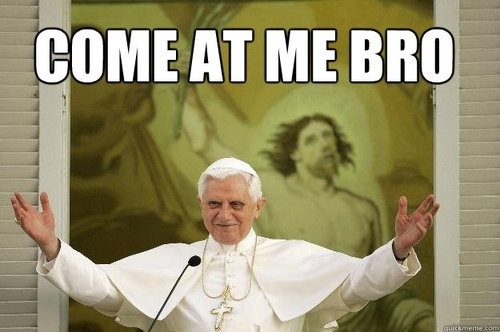Not long ago I was all nostalgic about newspapers. Then, as most of us did, I got over it, I switched to reading the news online and I haven’t bought a paper since.
Now, in 2013, I am feeling nostalgic about newspaper websites, a format of news that is under constant attack from apps, syndication, aggregation and personalisation.
But I see a new future forming, where we can get access to headlines and stories with speed, ease, and in any format we want.
First, a quick review.
The paper era
I grew up with the father spreading the Sydney Morning Herald unhelpfully across the breakfast table each day. He would read from it aloud and with impunity. It didn’t matter if anyone was already talking… or even if anyone was listening. And the amount of paper used in a weekend was also overlooked. In retrospect, much of this glorifying of papers was absurd. In fact, kicking back with a paper used to act as a forcefield to any responsibility. That’s partly why it was so excellent.

I hit high school where one of the great schoolboy thrills of taking Economics was having the Sydney Morning Herald (SMH) delivered to you each day. It was as if you had arrived in adulthood a full two years before your peers. I flaunted it – I now realise – to people who couldn’t care less. But I loved it and consumed it like some of my friends drank Coke – recess, lunch and sometimes under the desk in class.
As a fully formed adult, I had The Australian delivered to my house. This routine was much less romantic than I had remembered when growing up in the Blue Mountains. Instead of venturing into the front garden to discover the paper under a shrub, my entire family would be woken at 6am with a thud the size of a bass drum on our front door. The newsagents were depressingly on target.
One day when I had had enough, I emailed to cancel my subscription, adding a note that News Ltd really should consider a digital-only option. (They replied quickly. It turns out they do.)
The website era
For some months now I have been able to access The Oz stories by putting in my password – a process I repeat daily as I switch between devices – this is a major irritant). And I have now lost track and any memory of the what the subscription costs me. Both of these issues are deal-breakers when I consider signing up to multiple news websites.
Checking SMH used to be as routine as having breakfast. But thanks to their sensationalised frontpage splashes, their bipolar design and their use of wires syndication, the Herald and other major Australian news sites have long since been replaced in my routine.

The SMH website – where content has, at times, been an afterthought. via/ blogandwebsitereview.wordpress.com
I realise they’ve been forced to prioritise traffic and I hope the introduction of subscriptions may see a return to more meat and less milk.
Thanks to the web, I consume news from about ten different news websites around the world each day. Different days lead me to different topics and different news sources. While this remains my routine, I can safely say that while I do consider journalism to be an essential part of a democracy and needs to be paid for, I will never sign up for ten accounts. I don’t care if they offer me paywalls, metred models, apps with freemium or some kind of thrilling Shop-A-Docket BOGOF adventure. It is simply to much for one person to keep track of.
Thankfully, my habits are changing and I don’t think I will need to buy into all this.
The feed era
Technology has largely replaced my need for the web. Some days, I will not even touch a news website, thanks to apps and syndicated stories I read on site aggregators or a ‘Read It Later’ service such as Instapaper of Pocket. What I don’t find there I scroll passed on Twitter.
With the death of Google Reader, I now start my day at Google News. I will then skip to several different sites where I save links to read stories later, or I copy the text and paste it into an app that reads stories to me as I travel to and from work.
The Herald used to hold sway over the city, defining Sydney’s mood so accurately and charmingly that you wanted to save those big moments and photographic spreads for posterity. Then, the website you had to visit daily became a chore, with conflicting multiple typefaces, what seemed like more ads than content, hideous full-page ads and auto-playing videos. Now, even with an ad blocker, the Herald’s frontpage feels like gratuitous click-baiting: superficiality up front, quality if you can find it.
Will I pay for it when the Fairfax paywall finally appears? Possibly. If by paying I can avoid their entire website and just get to the stories and links I want, I will consider the cost worthwhile.
Here’s the rub – If I pay to avoid your paywall, I’d also be glad to avoid your website. What I want most of all is a direct route to your stories and journalists. Strip back the entire interaction between user and news and I will engage fully not in your site experience but the content. Which would you prefer?
I realise site design is there to distract me, tricking me into spending more time reading and clicking, but the time for this kind of manipulation is short. The kind of personalisation I am talking about not just for early-adopters. My 70-year-old father loves Readability, and the most old-school producer at my former employer Channel 7, was using Flipboard well before I was. The word is out.
I need easy, quick consumption.
I don’t want your website – I’ll use a reader.
I don’t need your curation – I’ll use Flipboard or Zite.
I don’t need your production – I’ll strip out the ads with an ad-blocker, any formatting using Readable and personalise it my own way.
If you did all this for me, I’d consume your content more readily, more often, and if I do that then social sharing will follow.
The future
I am optimistic that paywalls and premium content will lead quickly into an era of consume-it-your-way news services.

I’m already on Twitter and using it as a news feed, so how about premium twitter feeds that users must pay to access? The story loads within the twitter eco-system. The point is I got to the news where I was. Facebook or other social platforms could implement a similar model and it could serve targeted ads.
An aggregator app that charges a single subscription but provides me paywalled news from sources I respect? Awesome. It’s like iTunes but for news. Think Flipboard – with a Freemium model.
For those times when I have to use a website – a practice I liken to having to cash a cheque of pick up a parcel from the post office – can we please give the designs a genuine overhaul. We’ve done little more than remove serifs and rearrange pictures since 1996.
Frontpage editors, save all your features that let me save stories, drag sections, or pin the article to Pinterest (what?!). How about an update that genuinely modernises it like the HuffPo’s glorious NewsGlide or USA Today’s photo-led tablet-ready makeover. Those sites make me want to explore the news, not grab and run. Until then…
Me and news websites? We’re done.
More reading:
A paywall is not enough —Fairfax must become bespoke or fail – The Conversation
Fairfax gives a taste of what is to come for premium content charges – SMH (in 2010!)
Top 15 Most Popular News Websites – ebizmba.com (June 2013)
-33.867139
151.207114





















